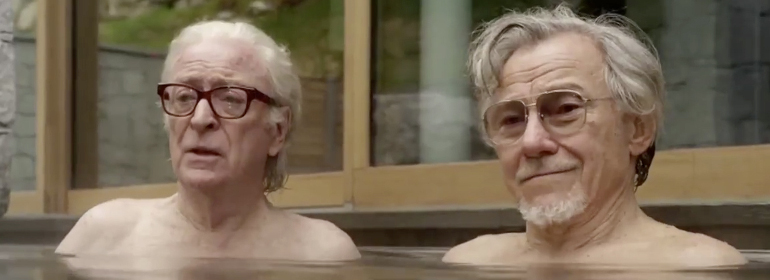A quirky contemplation on life and death, Paulo Sorrentino’s Youth is a treat to watch, but falls a little short of its aims, says Colum Finnegan.
Following up his Oscar winning The Great Beauty, Italian writer/director Paulo Sorrentino returns to similar subject matter with Youth, a relatively light-hearted exploration of deep questions about aging, fame and family. Michael Caine, as retired composer Fred Ballinger, leads a large ensemble cast staying together in a Swiss alpine hotel. Harvey Keitel is his close friend, Mick, a film director who is leading a coterie of bright young things to help write his last great script. The two men and their friendship are at the core here, their discussions about life, memory and health providing both the film’s clearest messages and most comedic moments.
Also staying at the hotel is Paul Dano (seemingly in disguise as Kid Rock) as a young actor researching a film role, bitter that he is only remembered for one moment of ‘levity’ when he played a robot. With Rachel Weisz as Caine’s daughter and Jane Fonda as the diva slated to be in Keitel’s new work, the film is fairly packed out with stars. Nevertheless the hotel also contains various other quirky character actors, an obese Maradona, a dance-loving masseuse, and an avid mountain climber, among others. With its diverse cast and setting, it’s all more than a little reminiscent of Wes Anderson’s The Grand Budapest Hotel, but this hotel story is for adults.
The plot revolves around Fred deliberating over whether or not to perform his most famous work, Simple Songs (which was actually composed by real life composer David Lang and is up for an Oscar, the film’s only nomination) for the Queen. For initially unrevealed reasons he declines. Looking back over his life, despite accusations from his daughter that he was a less than perfect father and husband, Fred seems to have no major regrets. Indeed he’s wholly upbeat throughout the film and this provides a clue as to Sorrentino’s vision.
Old age, as this film sees it, is not something to be feared, but rather a chance to look back and try to make sense of life’s absurdities. (Speaking of absurdities, watch out for a thoroughly satisfying cameo from Paloma Faith playing herself and prompting a surreal music video/nightmare scene.) The story meanders on, but this isn’t really a plot-driven piece. Instead we are presented with a series of vignettes, in which each character gets a moment to really act. Each of them is working through a different issue, all in some way tied to the central theme of aging, but by the film’s close it’s hard to understand what exactly Sorrentino wanted us to grasp. Nevertheless, longtime collaborator, Luca Bigazzi excels himself with lingering, well-lit cinematography that lends the film a trance-like, painterly air. It’s enough to make you feel as if you’re the one being pampered in a five-star resort.
Had Sorrentino pared the film down a little, and instead of yet another absurd interlude given us a little more actual substance, Youth could have been great. As it stands, it’s an enjoyable if somewhat enigmatic film, that compensates for its overly obscure message by almost guaranteeing to make you smile.
Youth is in cinemas now
© 2016 GCN (Gay Community News). All rights reserved.
